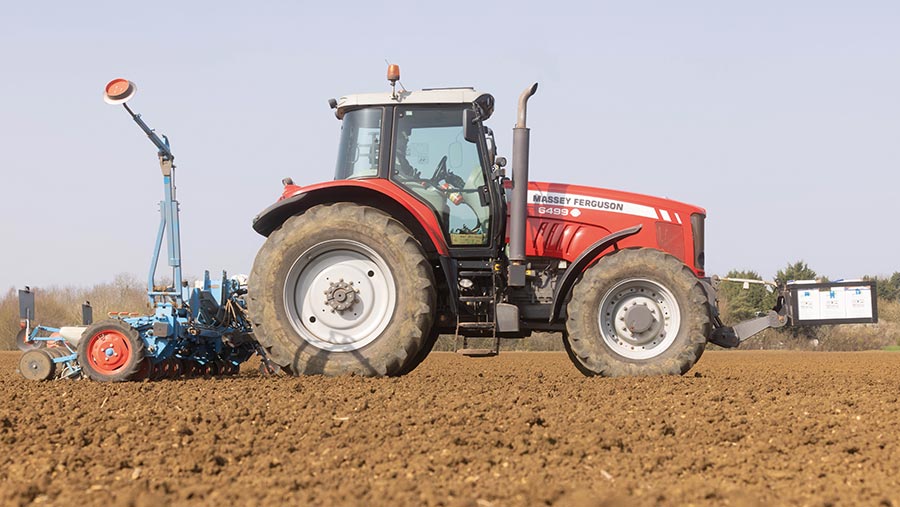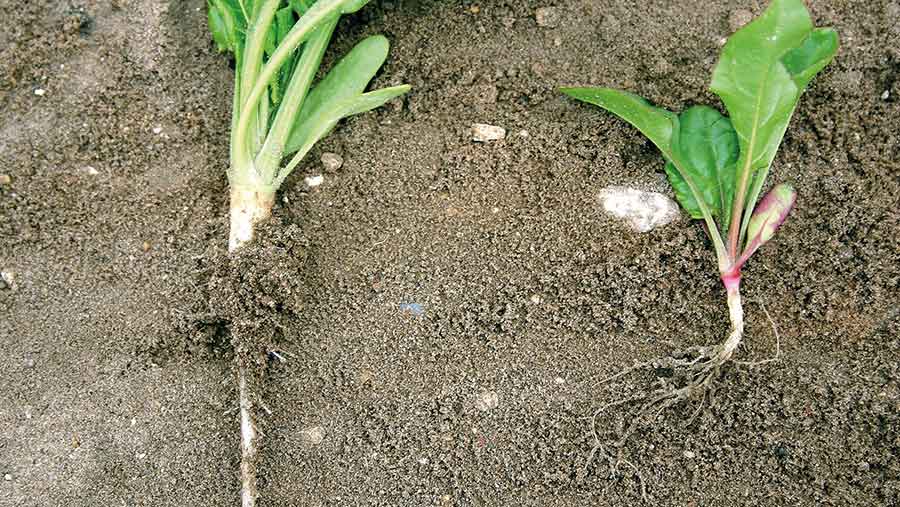Garlic-based nematicide performs well in BBRO beet trials
 © Tim Scrivener
© Tim Scrivener A garlic-based nematicide has proved its worth in independent sugar beet trials for a second successive season, despite the low risk of Docking disorder in 2022.
Docking disorder is caused by free-living stubby root (Trichodorus and Paratrichodorus) and needle (Longidorus) nematode damage, and symptoms include stunted plants, fanging of roots and ultimately yield loss.
Typically, damage is found on light sandy soils where free-living nematodes thrive, but there are increasing reports in recent seasons of the pests becoming a problem on other soil types.
See also: Will the beet moth strike again in crops this summer?
In the past, it was well managed by an in-furrow application of Vydate (oxamyl), but the active substance was withdrawn in 2021 and left growers with just one option in risky situations.
NEMGuard is a 45% garlic extract-based granular nematicide and gained full approval in sugar beet ahead of the 2022-23 campaign.
Garlic-based product for Docking disorder – key points
- Garlic-based nematicide gives positive root quality results again in 2022
- Data builds confidence after last season’s efficacy, which was equal to Vydate
- Use a higher rate if spring turns wet and nematode pressure may be high
- Get drills ready for using NEMGuard – check metering units and calibrate
Strip trials
Before it was fully approved, the British Beet Research Organisation (BBRO) carried out commercial strip trials in 2021-22 at high-risk sites, one in Yorkshire and two near Thetford in Norfolk.
Strips included an untreated control, Vydate at 6kg/ha, and the garlic product at rates of 10kg/ha and 20kg/ha.
Alistair Wright, crop protection scientist at BBRO, says the trials were very encouraging, with NEMGuard performing as well as Vydate, plants healthier from establishment relative to the untreated, and root fanging symptoms significantly reduced.
However, it was just one season and BBRO – supported by manufacturer Ecospray and marketing company Certis Belchim – established fully randomised trials during the 2022-23 campaign to improve understanding of its efficacy.

© Blackthorn Arable
In initial results from trial digs, it again had a positive impact on root shape.
Dr Wright says: “There is a perfect dose response to NEMGuard from the Yorkshire site, with an improvement in root quality seen as the rate increased, despite it being such a low-risk season. I was pleasantly surprised by the results.”
In its first season of commercial use in 2022, BBRO has had no negative feedback from growers who used the product for free living nematode control.
“Getting over the scepticism of an organic product like NEMGuard is a major stumbling block for uptake, but everything looks positive from what we’ve seen so far and should build confidence,” Dr Wright says.
“Get soil testing done as soon as possible, get your drill ready and if you have a free-living nematode issue and risk is high, use it in 2023.”
BBRO recommended growers use the lower 10kg/ha NEMGuard DE rate last season and advice remains the same for 2023.
However, the dose response seen in 2022-23 trials suggests that growers can edge towards the higher 20kg/ha rate, particularly as the 2023 sugar beet contract price is strong.
“Even if free-living nematode pressure is moderate, growers should see a return at the current value of sugar beet. If it turns out to be a wet year, the case is even stronger,” adds Dr Wright.
Calibrate applicators
The product is marketed in the UK by Certis Belchim, and the company’s eastern technical account manager, Jeremy Booth, urges first-time users to ensure their applicators are ready for 2023.
Those who have used Vydate historically will have an in-furrow applicator mounted to their drill and simply need to change cassettes and metering rotors to deliver NEMGuard’s higher rate range of 10-20kg/ha, rather than Vydate’s 6kg/ha.
Applicators should then be calibrated to ensure they are delivering the chosen dose accurately.
“Those who are using it for the second season should also have the applicator serviced and calibrated by a specialist before getting the drill into the first field to maintain accuracy,” stresses Mr Booth.

